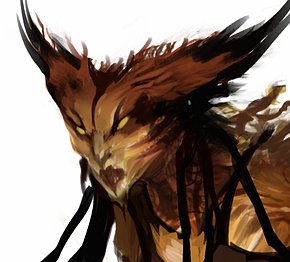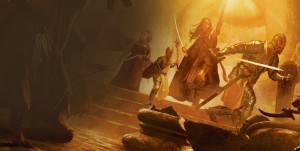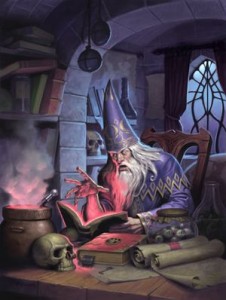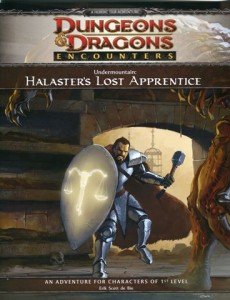Rituals are an underutilized aspect of 4e Dungeons & Dragons. One way to increase the way rituals are used in your campaign is to incorporate them into your skill challenge design. By providing opportunities for your PCs to use their abilities you increase their engagement in the campaign. They feel that they are more involved in what is occurring and are committed to seeing things through. Using rituals in your skill challenges does require a little bit of extra work, but is well worth the reward.
Tag: 4e
How does loot end up in a monster’s treasure horde? The beholder wasn’t wearing the chain mail or wielding the great axe when you fought it, yet there it is in its lair among the other wonders and treasures. You probably just assume that it belonged to the last guy who attempted to defeat the beholder before you and your party came along. But do you ever wonder who the last guy was? Do you ever feel guilty claiming his possessions? Sure he’s dead and has little use for them, but that doesn’t necessarily make them yours, does it?
Born To Be Wilden
 Our exploration of races in 4e continues with the Wilden. The Wilden are one of the new races found in the Players Handbook 3. As a race born of the primal fury of nature, the Wilden are the ultimate defender of nature. Similar to the Shardmind, which we looked at last week, the Wilden are awakened from nature itself. A new race they are a blank slate with no preconceptions or history. With only a primal desire to defend nature in all its forms, the Wilden is a powerful and intriguing new race.
Our exploration of races in 4e continues with the Wilden. The Wilden are one of the new races found in the Players Handbook 3. As a race born of the primal fury of nature, the Wilden are the ultimate defender of nature. Similar to the Shardmind, which we looked at last week, the Wilden are awakened from nature itself. A new race they are a blank slate with no preconceptions or history. With only a primal desire to defend nature in all its forms, the Wilden is a powerful and intriguing new race.
D&D Encounters (Week 6)
 I owe the players at my game table an apology. Because of my unpredictable dice, our encounter was over after only two rounds. Less than half-an-hour into week 6, we were done. Sorry guys. Whenever dice have an impact on the outcome of events, there’s always the outside chance that they’ll do the unexpected.
I owe the players at my game table an apology. Because of my unpredictable dice, our encounter was over after only two rounds. Less than half-an-hour into week 6, we were done. Sorry guys. Whenever dice have an impact on the outcome of events, there’s always the outside chance that they’ll do the unexpected.
Since I began playing and writing about my participation in D&D Encounters, I’ve tried to keep things as spoiler free as possible. This week I need to be specific, otherwise I won’t have very much to write about.
D&D Encounters is a 12-part adventure from Wizards of the Coast and it’s played out one encounter each week over 12 weeks.
1 d100 and 2 d4s
The Dungeon’s Master team took the dice quiz at DicePool.com and learned a lot about the old guard and our latest contributor in the process. Both Ameron and Wimwick came up as the devious d4. Neither the result nor the fact that we scored the same outcome came as a real surprise to us. What did open our eyes was Bauxtehude’s result. It turns out that he’s as loony as a d100.
 Although GenCon isn’t until August, registration began this past weekend. Both Ameron and Wimwick are representing Dungeon’s Master at GenCon this summer. We’re going to do everything we can to win the D&D Open Championship this year and we want you to join our team.
Although GenCon isn’t until August, registration began this past weekend. Both Ameron and Wimwick are representing Dungeon’s Master at GenCon this summer. We’re going to do everything we can to win the D&D Open Championship this year and we want you to join our team.
The D&D Championship isn’t going to be our only focus while were in Indianapolis. As you can probably guess, we’ll be playing a whole lot of D&D. We’re also looking forward to meeting other gamers and bloggers, as well as authors and game designers from Wizards of the Coast and other small publishing houses. We plan to hit a few seminars and even try out some new games. Yes, we’re actually going to try something other than D&D – something I haven’t done in a very long time. We’ve already registered for a few games but our schedules aren’t complete yet. As we nail down our schedules we’ll share what we’ve got on tap with our readers. But today I want to focus on the Championship.
So you’ve chosen the premise of your skill challenge. Great, now for the second step. The second step is all about forecasting possible developments for the challenge.
Bauxtehude, our newest contributor at Dungeon’s Master, continues his look at skill challenges. In yesterday’s article, Creating and Running Engaging Skill Challenges (Part 1) he stated that the best skill challenges pose a very open-ended problem to the party. Open-ended problems allow for a diversity of possible approaches as well as interpretations of the actual nature of the problem. Good skill challenges allow the party to overcome the problem presented to them in their own way while forcing them to interact with increasing complications. Picking up right where we left off yesterday, we follow the example begun in part 1 through to its natural conclusions with a heavy dose of Bauxtehude’s thoughts and insights added along the way.
I find it harmful to try to start setting DCs for various skill checks unless there are obvious hurdles that will need to be overcome. It’s better to not set any expectations for the party’s actions. The telling of the narration should reflect the choices the party is making rather than what the Dungeon Master thinks the party would do or what the Dungeon Master might figure the party ought to do. In this way time is better invested in thinking about what sort of place the PCs find themselves in.
The best skill challenges pose a very open-ended problem to the party. Open-ended problems allow for a diversity of possible approaches as well as interpretations of the actual nature of the problem. The other great virtue of open-ended problems is that they have the unique ability to develop in any number of directions allowing for a multitude of possible resolutions. Good skill challenges allow the party to overcome the problem presented to them in their own way while forcing them to interact with increasing complications. These challenges allow the party to exercise their wide range of skills as they see fit and interact with the results that they generate. Perhaps an example is in order.
The Dungeon’s Master team welcomes Bauxtehude, our newest contributor and author of today’s post. We’ve written a lot of article on skill challenges and thought Bauxtehude’s take on the subject provides new and exciting insights.
Have You Retrained Today?
 One of the great aspects of 4e is it officially recognized retraining. Finally, we had a formal rule for the process of substituting a power or a feat. In previous versions this aspect of the game was either forbidden or house ruled. Now, the concept itself isn’t a big stretch. The idea of swapping this power for that one isn’t new. What is new is the recognition of the game creator to enable this as an official rule.
One of the great aspects of 4e is it officially recognized retraining. Finally, we had a formal rule for the process of substituting a power or a feat. In previous versions this aspect of the game was either forbidden or house ruled. Now, the concept itself isn’t a big stretch. The idea of swapping this power for that one isn’t new. What is new is the recognition of the game creator to enable this as an official rule.
I’m well aware that many other gaming systems have had such rules for a long time, but D&D has not. Now, you might be wondering what’s the big deal. If I’m not happy with my character I’ll simply change it or speak with my DM about the problem. Fair enough and in most instances a change is able to be made. What happens if you only play RPGA games though and you don’t have a real mechanism to make the changes you desire because a new source book has been released?
D&D Encounters (Week 5)
 D&D Encounters is a 12-part adventure from Wizards of the Coast and it’s played out one encounter each week over the next 12 weeks.
D&D Encounters is a 12-part adventure from Wizards of the Coast and it’s played out one encounter each week over the next 12 weeks.
I was very happy when we were allowed to take an extended rest at the start of this week’s encounter. I learned afterward that the adventure is broken into three chapters and that week 5 was the beginning of chapter two (which explains the exciting cliffhanger-like ending last week).